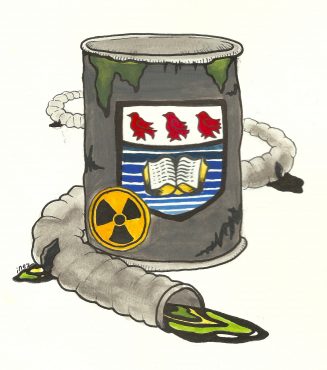Petition, article shames UVic for dealing with corporate climate change deniers

An opinion piece in The Tyee has called out UVic for attempting to profit from fossil fuel companies while trying to maintain its “commitment to sustainability.”
The Nov. 3 article, titled “UVic Seeks to Profit from Corporate Climate Change Deniers,” is written by UVic Environmental Studies assistant professor James Rowe and three students, Claire O’Manique, Emi Belliveau, and Malkolm Boothroyd, and castigates the university for not divesting from fossil fuel companies.
“We noticed that [UVic] had bought into Imperial Oil, and Imperial is majority owned by Exxon Mobil, and Exxon is kind of a poster-child for climate change denial,” says Rowe in a telephone call. “So, we thought that it was particularly egregious that UVic would be affiliating themselves with a company like that, and we wanted to highlight that contradiction.”
The contradiction Rowe refers to stems from what UVic has written on their website under the Commitment to Sustainability tab.
“The University of Victoria has a responsibility and desire to educate members of the University Community to engage effectively as global citizens, steward our natural resources in a responsible manner, and work towards a sustainable future,” the website reads.
Rowe’s article questions why UVic not only refuses to divest from fossil fuel companies but actually has increased their investment into Imperial Oil.
Rowe and his team discovered that in 2015, two years after the divestment campaign at UVic began, the university had a $5.9 million investment in Imperial Oil, which is majority owned by Exxon Mobil.
Exxon has been under a cloud of criticism for being aware of but still disregarding the harmful environmental implications of fossil fuels since as early as 1977.
“Our findings are clear: Exxon Mobil misled the public about the state of climate science and its implications,” says one New York Times article, after the publication launched its own investigation into whether Exxon misled their shareholders regarding climate change impacts for fear of their value dropping.
“Available documents show a systematic, quantifiable discrepancy between what Exxon Mobil’s scientists and executives discussed about climate change in private and in academic circles, and what it presented to the general public,” the Times article reads.
Rowe questions why UVic continues to invest in these companies that have a known history of climate change denial, and writes in the article how it’s ironic that UVic has lost money since investing in Imperial Oil.
After conducting an inside look into UVic’s finances, The Tyee article shows that, as of March 31 this year, the university has lost $1.2 million by investing in Imperial.
Rowe was in communication with the Chair of the Foundation board in the spring. He was told that one of the reasons the university does not want to divest is the optics of taking a political stand.
“Well if you’re investing in a company like Imperial Oil, which is a known climate change denier, that is taking a political stand,” argues Rowe. “So why don’t you instead take a better political stand . . . One that is actually aligned with UVic’s values, their Edge branding, their sustainability commitments, and divest from these companies.”
Rowe also learned that the university is concerned with the potential reactions from those donors who have historically populated the endowment with donations.
“[UVic has] communicated to us they worry what donors would think. The response that we make is that students have voted overwhelmingly in favour [of divestment], faculty have, a number of staff unions are in support [of divestment]. Those are the major constituencies on campus. They matter in our opinion much more than private donors,” says Rowe.
“Students, in terms of the fees that they pay, make up way more of UVic’s budget than private donations do. On top of that, taxpayers provide the majority of UVic’s budget — around 50 per cent.”
Rowe is encouraged by the recent $2.4 million investment UVic has received to research renewable marine-based energy. Yet, he is still wary of the university for not fully divesting away from fossil fuels.
“I just want to point out that it’s hypocritical and contradictory on the one hand to be pursuing these clean energy alternatives, while on the other hand, they’re trying to profit from companies that are fighting tooth and nail against the clean energy transition by lobbying against governments to slow down the pace of climate legislation that will make the clean energy alternatives more cost effective.”
For those reasons, Rowe is spearheading a petition addressing UVic President Jamie Cassels, urging the university to stop investing in fossil fuel companies and contradicting themselves.
The petition can be found at you.leadnow.ca/p/uvicdivest






